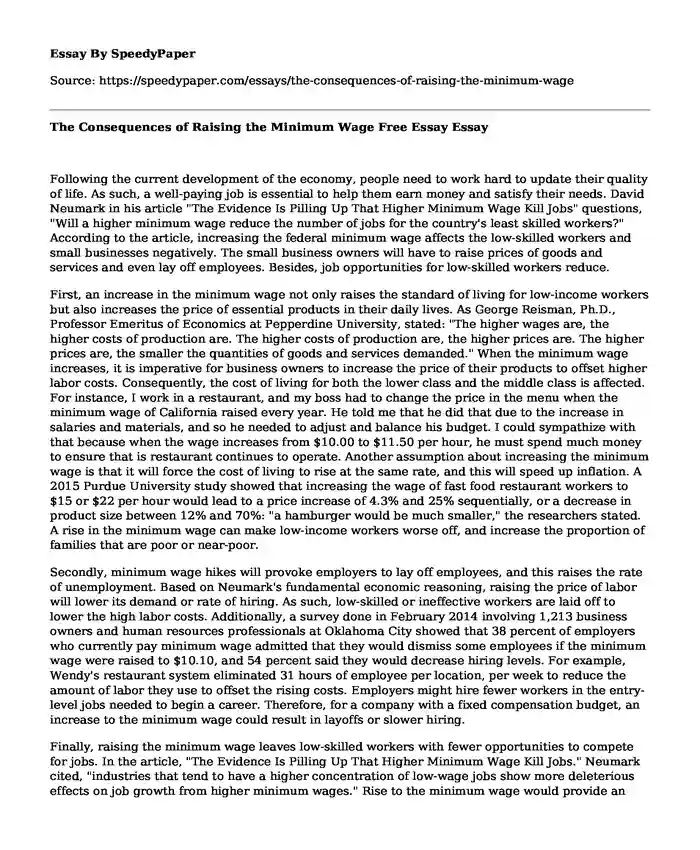
| Type of paper: | Essay |
| Categories: | Minimum wage |
| Pages: | 4 |
| Wordcount: | 828 words |
Following the current development of the economy, people need to work hard to update their quality of life. As such, a well-paying job is essential to help them earn money and satisfy their needs. David Neumark in his article "The Evidence Is Pilling Up That Higher Minimum Wage Kill Jobs" questions, "Will a higher minimum wage reduce the number of jobs for the country's least skilled workers?" According to the article, increasing the federal minimum wage affects the low-skilled workers and small businesses negatively. The small business owners will have to raise prices of goods and services and even lay off employees. Besides, job opportunities for low-skilled workers reduce.
First, an increase in the minimum wage not only raises the standard of living for low-income workers but also increases the price of essential products in their daily lives. As George Reisman, Ph.D., Professor Emeritus of Economics at Pepperdine University, stated: "The higher wages are, the higher costs of production are. The higher costs of production are, the higher prices are. The higher prices are, the smaller the quantities of goods and services demanded." When the minimum wage increases, it is imperative for business owners to increase the price of their products to offset higher labor costs. Consequently, the cost of living for both the lower class and the middle class is affected. For instance, I work in a restaurant, and my boss had to change the price in the menu when the minimum wage of California raised every year. He told me that he did that due to the increase in salaries and materials, and so he needed to adjust and balance his budget. I could sympathize with that because when the wage increases from $10.00 to $11.50 per hour, he must spend much money to ensure that is restaurant continues to operate. Another assumption about increasing the minimum wage is that it will force the cost of living to rise at the same rate, and this will speed up inflation. A 2015 Purdue University study showed that increasing the wage of fast food restaurant workers to $15 or $22 per hour would lead to a price increase of 4.3% and 25% sequentially, or a decrease in product size between 12% and 70%: "a hamburger would be much smaller," the researchers stated. A rise in the minimum wage can make low-income workers worse off, and increase the proportion of families that are poor or near-poor.
Secondly, minimum wage hikes will provoke employers to lay off employees, and this raises the rate of unemployment. Based on Neumark's fundamental economic reasoning, raising the price of labor will lower its demand or rate of hiring. As such, low-skilled or ineffective workers are laid off to lower the high labor costs. Additionally, a survey done in February 2014 involving 1,213 business owners and human resources professionals at Oklahoma City showed that 38 percent of employers who currently pay minimum wage admitted that they would dismiss some employees if the minimum wage were raised to $10.10, and 54 percent said they would decrease hiring levels. For example, Wendy's restaurant system eliminated 31 hours of employee per location, per week to reduce the amount of labor they use to offset the rising costs. Employers might hire fewer workers in the entry-level jobs needed to begin a career. Therefore, for a company with a fixed compensation budget, an increase to the minimum wage could result in layoffs or slower hiring.
Finally, raising the minimum wage leaves low-skilled workers with fewer opportunities to compete for jobs. In the article, "The Evidence Is Pilling Up That Higher Minimum Wage Kill Jobs." Neumark cited, "industries that tend to have a higher concentration of low-wage jobs show more deleterious effects on job growth from higher minimum wages." Rise to the minimum wage would provide an incentive for the business owner to invest in technology, automated processes, and machinery to increase productivity rather than human resources. Nowadays, we can put our credit card in a machine and pump gas by ourselves. Increasingly, some restaurants and coffee shops such as Starbuck, McDonald, and Jack in The Box are following these trends: we can order at a kiosk and pick up our food at the counter, or scan and bag our own items. The higher the incentive to replace labor with machinery, the more jobs will be lost. As the price of labor goes up, employers will have an excuse to use machines to replace human labor. Thu, low-skilled workers will have increased chances of losing jobs.
In conclusion, raising the federal minimum wage will highly affect the low-skilled workers and small businesses in that there will be reduced the job growth, increase the cost of living and speed up the inflation, and less chance for low-skilled workers. In my opinion, the minimum wage should not be increased to keep the existing human labor and businesses stable. When a company grows strongly, it creates more jobs, and employees have more opportunities to compete and improve the quality of their lives. Inflation of products will also reduce.
Cite this page
The Consequences of Raising the Minimum Wage Free Essay. (2022, Nov 02). Retrieved from https://speedypaper.net/essays/the-consequences-of-raising-the-minimum-wage
Request Removal
If you are the original author of this essay and no longer wish to have it published on the SpeedyPaper website, please click below to request its removal:
- Free Essay on Management Issues at the McDonald's Chain of Restaurants
- Management of Diabetes - Free Essay with a Literature Review Example
- Justice Approach - Free Essay on Juvenile Justice
- Comparative Literature Essay, Free Example for Everyone
- Improving Union-Management Relations
- Essay Sample on Solutions to Environmental Issues in Memphis, Tennessee
- Mandatory Minimum Sentencing Law
Popular categories




